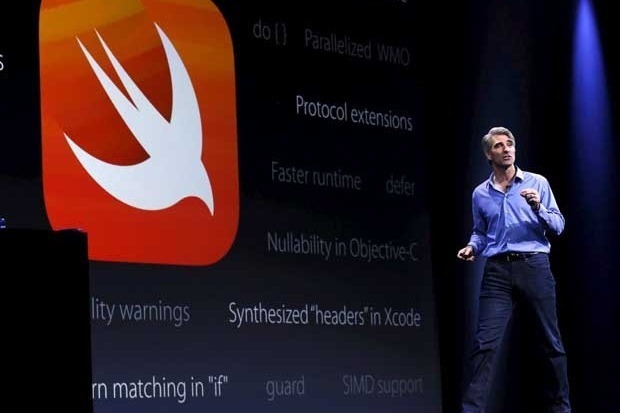According to colleagues, Swift developer Chris Lattner reportedly left Apple because of a culture of secrecy within the company — a claim that Lattner denies.
"He always felt constrained at Apple in terms of what he could discuss publicly — resorting to off-the-record chats, surprise presentations, and the like," one of Lattner's self-proclaimed colleagues told Business Insider. "Similarly, I know he was constrained in recruiting and other areas. Eventually I know that can really wear people down."
Given the relatively open-source nature of Swift, Lattner can continue to contribute to the language, to some extent even after his recently announced departure from Apple.
Lattner studied computer science at the University of Portland, Ore. After being one of the co-authors of LLVM, Lattner was hired by Apple in 2005, and was instrumental in the advancement of Xcode, Apple's OpenGL implementation, and every aspect of Apple's Swift rollout and continued development.
Lattner was hired by Tesla, and is the company's Vice President of Autopilot Software. At the time of Lattner's departure, Apple coder Ted Kremenek was selected to lead the Swift development team.
Update:
Since Business Insider's original report, Lattner has taken to Twitter to refute the claims of being stymied by secrecy.
My decision has nothing to do with "openness". The "friend" cited is either fabricated or speculating. Folk just want to make look bad.
— Chris Lattner (@clattner_llvm) January 13, 2017
Not just a problem for coders
Apple had a problem with secrecy in dealing with artificial intelligence academics. Until recently, Apple researchers weren't allowed to publish findings, or cooperate with colleagues to advance the field as a whole.
At December's Neural Information Processing Systems (NIPS) conference, Apple Director of Artificial Intelligence Research Russ Salakhutdinov announced that Apple employees in artificial intelligence were allowed, and in some cases encouraged to both publish, and "engage with academia."
In August, former Apple Watch heart rate sensor engineer Bob Messerschmidt pointed out the same issues. Messerschmidt claimed that under CEO Steve Jobs, stealth was employed mainly to elicit a big surprise from the public and press when a product was ultimately announced. After Jobs' death, the engineer believed that Apple uses secrecy to "maintain an empire," or make projects feel more important than they really are.
Partly as a result of Apple's secrecy culture, Apple's former global data center network manager Jason Forrester broke free, and founded networking company Snaproute. Forrester's company has the stated goal to "free talented network engineers to do their job to the best of their ability, unconstrained by vendor lock-in."
"Slowly, our desire to share our ideas with the world began to overshadow the thrill and pride of working for Apple," Forrester recalled in June. "My team and I left in 2015. Truth be told, I spent a few days crying on the couch."
 Mike Wuerthele
Mike Wuerthele







-m.jpg)






 William Gallagher
William Gallagher
 Wesley Hilliard
Wesley Hilliard
 Malcolm Owen
Malcolm Owen

 Christine McKee
Christine McKee

 Sponsored Content
Sponsored Content










60 Comments
I've never been with a single job for more than three years.
Are you listening Tim Cook, are you listening?? Steve has gone. Now work out what areas and products really need secrecy and what areas do not. Otherwise lose good people who actually give a s**t !!
I have been known (past) to let off steam at frustrations (sort of like a pressure cooker has to let off steam) when talking to colleagues I trust, but I don't think I have ever mentioned why I left a company and taken a job elsewhere. If you asked them after the fact, they would likely tell you of my frustrations and how they were why I left, but in almost all cases it would be wrong. Every job every company I have worked for I have had frustrations, but that is normal.... you rarely agree with everything.... and it can be frustrating when you know you are right and you can't do it the right way. Of course knowing you are right, is not the same as always being right.... especially when your context may be more limited due to need to know about or other reasons why you may not be privy to certain information.
Apple is secretive, but then most companies I have worked for don't really appreciate you discussing ongoing projects with people outside the company.... so if that is the reason.... he might have to eventually move to an open source company (and even then there might be some secrecy) or back to academia.